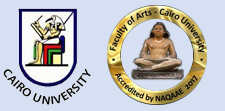عنوان المقال عربي
المتغيرات الاجتماعية المرتبطة بعملية ادارة المخلفات الصلبة (دراسة ميدانية لعينة من منتجي وجامعي المخلفات في إطار التنمية المستدامة)
Document Type
Original Study
Keywords English
social variables, waste solid-sustainable development
كلمات مفتاحية عربي
المتغيرات الاجتماعية, المخلفات الصلبة, جامعي ومنتجي المخلفات, التنمية المستدامة
Abstract English
The aim of the research is to identify the social variables associated with the solid waste management process for both waste producers and workers in the collection and treatment of waste in the context of sustainable development. The research sample consisted of (100) male and female cases in the field of waste collection, and (100) A case of a female waste producer,The data were collected from the collectors sample from the area of Manshia Nasr, the sample of the producers from three areas (high - medium - popular),The research belongs to descriptive research using the social survey method by applying a questionnaire form to reveal the social variables for the category of waste producers and waste collectors,The questionnaire included (Personal Data on the collector, nature of work, work pressures, and a view of the waste collectors of its importance in the framework of sustainable development. The producer questionnaire (personal data, behavior of waste producers, awareness of waste producers of its importance in the context of sustainable development and environmental conservation), and the researcher used the following theories (sustainability theory, Thomson's garbage theory),The research reached several result; The behavior of the poor to deal with household solid waste is environmentally better than the behavior of the rich. With only household waste, the quality of waste varies from one level to another,Whereas the waste that has value and is preferred by the waste collectors is produced from high- areas, followed by the medium and comes in the last degree in the popular areas, there is no unemployment in the waste collectors' societies, but not all recycling operations are within the scope of preserving the environment.
الملخص العربي
هدف البحث إلى التعرف على المتغيرات الاجتماعية المرتبطة بعملية إدارة المحلفات الصلبة لکلا من منتجي المخلفات والعاملين في جمع ومعالجة المخلفات في إطار التنمية المستدامة، تکونت عينة البحث من (100)حالة من الذکور والإناث في مجال جمع المخلفات، و(100)حالة من الإناث من منتجي المخلفات، تم جمع بيانات عينة الجامعي من حي منشأة ناصر وعينة المنتجي من ثلاث أحياء(راقي – متوسط –شعبي)، ينتمي البحث إلى البحوث الوصفية بأستخدام منهج المسح الاجتماعي بتطبيق أستمارة استبيان للکشف عن المتغيرات الاجتماعية لفئة منتجي المخلفات وجامعيها تضمنت الأستمارة(بيانات أولية عن الجامع،طبيعة العمل،ضغوط العمل،رؤية جامعي المخلفات لأهميتها في إطار التنمية المستدامة)،وأستمارةالمنتجي(البيانات الأولية،سلوک منتجي المخلفات،وعي منتجي المخلفات بأهميتها في إطار التنمية المستدامةوالمحافظة على البيئة)،وأستعانت الباحثة بالنظريات الآتية(نظرية الأستدامة،نظرية القمامة لطومسون)، وتوصل البحث لعدة نتائج أهمها سلوک منتجي المخلفات في القاهرة الکبري والسياسات المتبعة لا تؤدي إلى التنمية المستدامة للرأسمال البيئي والبشري والاجتماعي،سلوک الفقراء للتعامل مع المخلفات الصلبة المنزلية أفضل بيئيا من سلوک الأغنياء،يقتصر السلوک الإيجابي في الحفاظ على البيئة نظيفة من التلوث بالمخلفات على محيط الأسرة فقط،نوعية المخلفات تختلف من مستوي إلى مستوي آخر، حيث أن المخلفات التي لها قيمة ويفضلها جامعي المخلفات هي الناتجة من من المناطق الراقية، تليها المتوسطة وتأتي في الدرجة الأخيرة المناطق الشعبية،لا توجد بطالة في مجتمعات جامعي المخلفات، حيث أن جميع أفراد الاسرة يعملوا في الجمع والفرز،رغم توافر الوعي لدي العاملين في جمع ومعالجة المخلفات عن قيمتها لکن ليست کل عمليات إعادة التدوير في نطاق الحفاظ على البيئة
Recommended Citation
beshay, Dina gamal zaki
(2022)
"Social variables related to the solid waste management process (a field study of a sample of waste producers and collectors within the framework of sustainable development),"
Journal of the Faculty of Arts (JFA): Vol. 82:
Iss.
1, Article 5.
DOI: https://doi.org/10.21608/jarts.2021.70291.1128
Digital Object Identifier (DOI)
10.21608/jarts.2021.70291.1128
Accept Date
2021-05-31
Publication Date
1-1-2022

